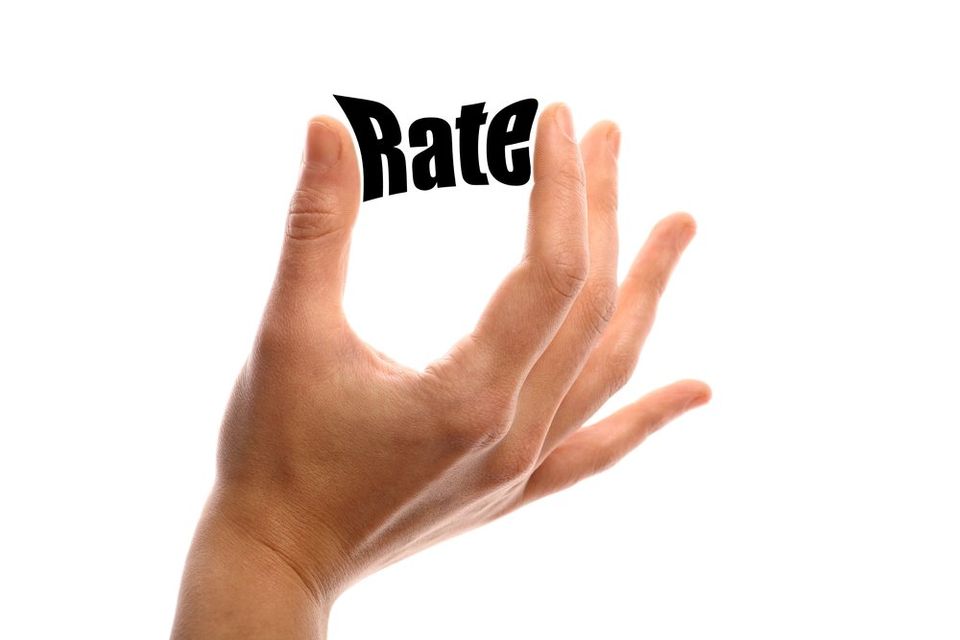It's NOT All About The Rate
Michael Hallett • June 22, 2015

ob-sess(ed):
the act of being preoccupied or fill the mind continually, intrusively and to a troubling extend.
As mortgage consumers we get obsessed with obtaining best rate, we caught in the cross-hairs of lender marketing. Lenders spends millions of dollars annually to pitch their message; some listen and some don't. As consumers we all want make sure we are getting the best value for our money. When entering into the world of purchase and owning real estate, there should be a detailed plan laid out for one to follow. We should make sure all our plans fit the mortgage products we inherently rely on. Would you put a square peg in a round hole?
Along with making sure the mortgage product is suitable there is also an element of competition between friends, family members and even colleagues at work. Consumers thought process goes something like this (...and I was once part of this faculty)..."I need to get the lowest rate so that I supersede the rate that (enter name here) got..." That statement couldn't be further from the true, it's 100% wrong.
We all want to pay as little as possible up front, but never put any thought into life's uncertainties. What if you need to break the mortgage?; to consolidate some debt, require equity for a renovation, moving to another town/city where your current lender does lend, leverage equity to take advantage of some financial planning strategies...the list goes on.
60% or 6 out of every 10 mortgages that originally opt for a 5 year fixed term are changed/broken/altered 38 months into the contract. The act of breaking ones mortgage will yield a penalty on the outstanding balance for 22 months. The penalty will be either an Interest Rate Differential calculation or 3 month interest, whatever is greater. There is so much more to choosing a mortgage rate and term than just the 5 bold characters ?.??% being advertised.
Borrower's have to look past the numbers and educate themselves on the terms of that rate being offered; the fine print!
Depending on the RATE and its terms that penalty can be dramatically different. Lenders all have a suite of various products to fit your the consumers wants and needs. It's up to you and your Mortgage Expert to navigate through the gauntlet of rate sheets and product information to find what works for you and your specific scenario. As Mortgage Experts we have access to a wide range of lenders; major chartered banks, credit unions and investment lenders. At times there could be a difference of 10 to 20 basis point (0.10-0.20%) from lender to lender.
Let's take for example a rate of 2.44% vs 2.64% for a 5 year fixed term. It's obvious which one most borrowers would gravitate to, but is it worth it? What are the pitfalls? These two rates have drastically different penalty structures even though they are offered by the same lender. The 2.44% rate holds a 3% penalty on the outstanding mortgage balance (OSB). The 2.64% rate calculates the Interest Rate Differential (IRD) or 3 months interest, whatever is greater to determine the penalty.
Here is an example of what it would cost to exit these mortgage contracts early. We will use the 60% rule along with a starting balance of $330,000, 25 year amortization and $0 prepayments made to the principal for the first 38 months.
Rate 2.44% 2.64%
OSB @ 38 mos $298,401.05 $299,153.80
Penalty 8,952.03 $2,468.02
Difference $6,484.01
Monthly payment $1,468.45 $1,501.39
Difference over 38 mos $1,251.72
Same term but different mortgage product yields a difference in penalty of $6,484.01. Over that same 38 month term the higher interest will have an 'out-of-pocket' difference of $1,251.72. Now ask yourself, with all of life's uncertainties which would you prefer the 2.44% or 2.64% rate. I would choose the higher rate and pay $5,232.29 less.
This is where having a knowledgeable Mortgage Expert working for you pays off in spades. They will review your plan and recommend the best mortgage product. Make sure you examine all aspects of the mortgage, 60% of 5 year fixed mortgages are altered. Here's yet another reason to always consider variable rate mortgages, much more flexible and only yield 3 month interest penalty on the OSB no matter where you are in the contract timeline.
If you are looking for personalized mortgage advice, contact me anytime!
SHARE
MY INSTAGRAM
Mortgage Brokering meets mountain biking and craft beer. A couple months ago I set for a bike ride with the intention of answering few mortgage related questions, mission accomplished. Any good bike ride pairs nicely with a tasty beer which we enjoyed @parksidebrewery. Hope you see the passion I have for brokering, biking and beer. @torcabikes #mountainbikingmortgagebroker
TEASER alert...at thats what I think they call it in the business. Years ago a wrote a blog called BEERS BIKES AND MORTGAGES. I some how (in my head) blended all 3 topics into 1 blog. Simply put, I enjoy aspects of all 3 with each of them providing something different. I re-united with the talented Regan Payne on a project that I think will shed a bit more light on who I am and what I do. #craftbeer #mountainbike #mortgagebrokerbc #dlccanadainc
I saw this hat on Instagram, that very moment I knew I needed it. As a BC boy born and bred The Outdoorsman hat needed to be added to my collection. As someone who loves BC and most things outdoor, I’m now glad I have a cool hat to wear and fly the flag of BEAUTIFUL BRITISH COLUMBIA. It will be in my bag for all post-exploration celebratory cold pints. If you want to check them out or add one to your collection go to @nineoclockgun ...and yes my facial hair matches the hat as well.
View more

Bank of Canada maintains policy rate at 2¼%. FOR IMMEDIATE RELEASE Media Relations Ottawa, Ontario January 28, 2026 The Bank of Canada today held its target for the overnight rate at 2.25%, with the Bank Rate at 2.5% and the deposit rate at 2.20%. The outlook for the global and Canadian economies is little changed relative to the projection in the October Monetary Policy Report (MPR). However, the outlook is vulnerable to unpredictable US trade policies and geopolitical risks. Economic growth in the United States continues to outpace expectations and is projected to remain solid, driven by AI-related investment and consumer spending. Tariffs are pushing up US inflation, although their effect is expected to fade gradually later this year. In the euro area, growth has been supported by activity in service sectors and will get additional support from fiscal policy. China’s GDP growth is expected to slow gradually, as weakening domestic demand offsets strength in exports. Overall, the Bank expects global growth to average about 3% over the projection horizon. Global financial conditions have remained accommodative overall. Recent weakness in the US dollar has pushed the Canadian dollar above 72 cents, roughly where it had been since the October MPR. Oil prices have been fluctuating in response to geopolitical events and, going forward, are assumed to be slightly below the levels in the October report. US trade restrictions and uncertainty continue to disrupt growth in Canada. After a strong third quarter, GDP growth in the fourth quarter likely stalled. Exports continue to be buffeted by US tariffs, while domestic demand appears to be picking up. Employment has risen in recent months. Still, the unemployment rate remains elevated at 6.8% and relatively few businesses say they plan to hire more workers. Economic growth is projected to be modest in the near term as population growth slows and Canada adjusts to US protectionism. In the projection, consumer spending holds up and business investment strengthens gradually, with fiscal policy providing some support. The Bank projects growth of 1.1% in 2026 and 1.5% in 2027, broadly in line with the October projection. A key source of uncertainty is the upcoming review of the Canada-US-Mexico Agreement. CPI inflation picked up in December to 2.4%, boosted by base-year effects linked to last winter’s GST/HST holiday. Excluding the effect of changes in taxes, inflation has been slowing since September. The Bank’s preferred measures of core inflation have eased from 3% in October to around 2½% in December. Inflation was 2.1% in 2025 and the Bank expects inflation to stay close to the 2% target over the projection period, with trade-related cost pressures offset by excess supply. Monetary policy is focused on keeping inflation close to the 2% target while helping the economy through this period of structural adjustment. Governing Council judges the current policy rate remains appropriate, conditional on the economy evolving broadly in line with the outlook we published today. However, uncertainty is heightened and we are monitoring risks closely. If the outlook changes, we are prepared to respond. The Bank is committed to ensuring that Canadians continue to have confidence in price stability through this period of global upheaval. Information note The next scheduled date for announcing the overnight rate target is March 18, 2026. The Bank’s next MPR will be released on April 29, 2026. Read the January 28th, 2026 Monetary Report

Mortgage Registration 101: What You Need to Know About Standard vs. Collateral Charges When you’re setting up a mortgage, it’s easy to focus on the rate and monthly payment—but what about how your mortgage is registered? Most borrowers don’t realize this, but there are two common ways your lender can register your mortgage: as a standard charge or a collateral charge . And that choice can affect your flexibility, future borrowing power, and even your ability to switch lenders. Let’s break down what each option means—without the legal jargon. What Is a Standard Charge Mortgage? Think of this as the “traditional” mortgage. With a standard charge, your lender registers exactly what you’ve borrowed on the property title. Nothing more. Nothing hidden. Just the principal amount of your mortgage. Here’s why that matters: When your mortgage term is up, you can usually switch to another lender easily —often without legal fees, as long as your terms stay the same. If you want to borrow more money down the line (for example, for renovations or debt consolidation), you’ll need to requalify and break your current mortgage , which can come with penalties and legal costs. It’s straightforward, transparent, and offers more freedom to shop around at renewal time. What Is a Collateral Charge Mortgage? This is a more flexible—but also more complex—type of mortgage registration. Instead of registering just the amount you borrow, a collateral charge mortgage registers for a higher amount , often up to 100%–125% of your home’s value . Why? To allow you to borrow additional funds in the future without redoing your mortgage. Here’s the upside: If your home’s value goes up or you need access to funds, a collateral charge mortgage may let you re-borrow more easily (if you qualify). It can bundle other credit products—like a line of credit or personal loan—into one master agreement. But there are trade-offs: You can’t switch lenders at renewal without hiring a lawyer and paying legal fees to discharge the mortgage. It may limit your ability to get a second mortgage with another lender because the original lender is registered for a higher amount than you actually owe. Which One Should You Choose? The answer depends on what matters more to you: flexibility in future borrowing , or freedom to shop around for better rates at renewal. Why Talk to a Mortgage Broker? This kind of decision shouldn’t be made by default—or by what a single lender offers. An independent mortgage professional can help you: Understand how your mortgage is registered (most people never ask!) Compare lenders that offer both options Make sure your mortgage aligns with your future goals—not just today’s needs We look at your full financial picture and explain the fine print so you can move forward with confidence—not surprises. Have questions? Let’s talk. Whether you’re renewing, refinancing, or buying for the first time, I’m here to help you make smart, informed choices about your mortgage. No pressure—just answers.










































































































